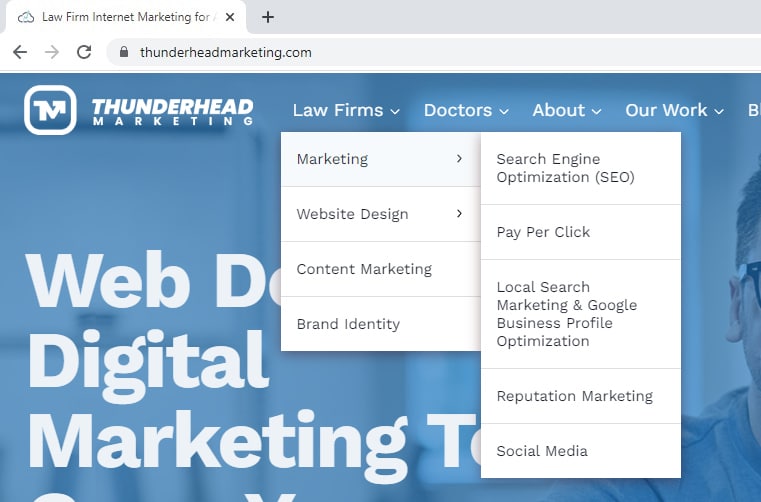A well-crafted blog can be a game-changer for a law firm looking to stand out among a sea of competitors online. It’s not just about showcasing expertise; it’s about connecting with your audience, offering them value, and establishing yourself as the go-to authority on their legal issues.
At Thunderhead Marketing, we’ve been blogging for attorneys for nearly 15 years. While the look and feel of this platform may have changed a lot in that time, there are some essential elements of a blog that just never go out of style. Whether you’re starting from scratch or looking to refine your existing content, here’s what you need to transform your law firm’s blog into a compelling, client-attracting platform.
Understanding Your Audience: The Key to Relevant Content
Before you dive into the world of keywords and design, the first step in creating an impactful law firm blog is understanding who you’re writing for. Your audience is not just anyone; they are potential clients seeking guidance on specific legal issues. Tailoring your content to meet the needs and interests of your target clientele is crucial.
Identifying Your Clientele
Begin by asking yourself: Who are my ideal clients? Are they individuals seeking personal legal advice, businesses needing corporate law services, or perhaps both? Understanding your audience’s demographics, such as their age, occupation, and the legal challenges they face, allows you to create content that resonates with them on a personal level.

Addressing Their Needs
Once you have a clear picture of your audience, consider what they’re looking for in a law firm’s blog. Are they seeking answers to common legal questions, guidance through complex legal processes, or updates on changes in law that could affect them? Your blog should aim to address these needs directly. By providing valuable, relevant information, you become more than just a service provider; you become a trusted advisor.
Establishing a Connection
The key to successful content is not only to inform but also to engage. Use your blog to establish a connection with your readers. Share real-life examples, client stories (while maintaining confidentiality), or insights into how your firm has navigated certain legal challenges. This not only showcases your expertise but also humanizes your firm, making it more approachable and relatable to potential clients.
Remember, a successful law firm blog is one that speaks directly to the needs and interests of its audience. By understanding and addressing these aspects, you set the foundation for a blog that not only attracts but also retains a dedicated readership.
Crafting a Strategic Content Calendar
A well-structured content calendar is a cornerstone of any successful law firm blog. It ensures a consistent flow of content that engages your audience, reinforces your expertise, and boosts your online presence. The secret lies in striking the right balance between evergreen content and topics that align with current legal trends.
Building a Content Calendar
Start by plotting out a calendar that spans several months. This approach allows you to plan for both predictable events (like changes in legislation at the start of a new year) and space for spontaneous content triggered by unforeseen legal developments. Aim for a mix of posts that cater to different aspects of your practice and the varied interests of your audience.
Evergreen Content: The Backbone of Your Blog
Evergreen content is timeless, continuing to be relevant and useful long after it’s published. For a law firm, this could include topics like “Understanding Your Rights in a Workplace Dispute” or “The Basics of Estate Planning.” Such content not only serves as a reliable resource for readers but also helps in building a strong SEO foundation, drawing traffic to your blog continuously.
Keeping Up with Legal Trends
While evergreen content provides a stable foundation for your blog, staying abreast of current legal trends and news adds a dynamic and timely element to your platform. Whether it’s a landmark court ruling, a change in state law, or a notable case in the news, these topics can attract immediate attention and show that your firm is on top of the latest developments in the legal field.
Strategies for Topic Brainstorming
Generating ideas for blog posts can sometimes be challenging. Regular team brainstorming sessions can be invaluable. Encourage members of your team to bring forward topics based on their areas of expertise or recent client inquiries. Monitoring legal forums, news sites, and even social media can also spark ideas for relevant and engaging content.
By developing a content calendar that balances evergreen advice with insights into current legal trends, your law firm’s blog will not only attract a wider audience but also establish itself as a comprehensive, up-to-date resource for legal information and advice.

Integrating SEO Best Practices
Search Engine Optimization (SEO) is a critical element for any law firm aiming to increase its online visibility and attract more potential clients. Integrating effective SEO strategies into your blog can significantly enhance your firm’s discoverability in search engine results, connecting you with individuals actively seeking legal assistance.
Understanding the Importance of SEO for Law Firms
SEO is more than just a buzzword; it’s a vital tool in the online marketing arsenal. For law firms, appearing at the top of search results is not just about prestige; it’s about being easily accessible to those in need of legal services. Effective SEO ensures that when someone searches for legal advice in your area of expertise, your firm appears prominently in their search results.
Keyword Integration: Speaking Your Audience’s Language
The right keywords can act as bridges connecting your content with your target audience. Start by identifying terms and phrases that potential clients might use when searching for legal services similar to yours. This can include specific areas of law, common legal questions, or geographical locations if you’re focusing on local clientele. Use these keywords naturally in your blog posts, headings, and meta descriptions to improve your search rankings without compromising the quality of your content.
Embracing Local SEO
For many law firms, local clients form the core of their business. Local SEO is about optimizing your blog for searches that are specific to your geographical location. This includes incorporating location-specific keywords, creating content that addresses local legal issues, and ensuring your firm’s address and contact information are consistently listed across all online platforms.
Staying Updated with SEO Trends
SEO is an ever-evolving field, and staying informed about the latest trends and algorithm updates is crucial. Regularly updating your blog with fresh, relevant content, optimizing for mobile users, and ensuring a fast-loading website are just a few practices that can keep you ahead in the SEO game.
Writing with Clarity: Finding the Right Tone
The writing style and tone of your blog are critical in determining how your audience perceives and engages with your content. For law firms, striking the right balance between professional authority and accessible language is key to effectively communicating with potential clients.
Be Professional and Authoritative, But Avoid Legalese
Your blog is a reflection of your law firm’s professionalism and expertise. Therefore, maintaining a tone that is authoritative and informed is essential. However, this doesn’t mean your content should be laden with complex legal jargon. The overuse of legalese can alienate readers who are not well-versed in legal terminology.
Your blog should serve as a bridge between your law firm and potential clients, demystifying the law rather than complicating it. Use simple, straightforward language to explain legal processes and concepts. This approach not only makes your content more accessible but also helps build trust with your audience.
Engaging Storytelling: Bringing the Law to Life
A compelling way to connect with readers is through storytelling. By weaving real-life scenarios or hypothetical situations into your content, you can illustrate legal concepts more vividly. This not only makes your blog more engaging but also helps readers understand how the law applies in practical, everyday situations. Remember to always respect client confidentiality and privacy when sharing any real cases or examples.
Consistency is Key
Consistency in tone and style is crucial for building a recognizable brand voice. Whether you have multiple authors contributing a single dedicated law blog writer, ensure that everyone is aligned with the desired tone and style guidelines. This consistency helps in establishing your blog as a reliable, professional source of legal information.
Enhancing Engagement with Multimedia and Visuals
Humans are visual creatures, and incorporating graphics, photographs, or videos into your blog posts can break up dense legal text, making it more digestible and engaging. Visuals can help illustrate complex legal concepts, provide quick summaries through infographics, or showcase your team and office through photographs and videos. This not only enriches the user experience but also aids in better understanding and retention of information.
Legal Considerations for Multimedia Use
While using visuals, it’s crucial to be mindful of the legal aspects. Ensure that all multimedia elements are either created in-house, purchased legally, or sourced from royalty-free platforms. Be particularly careful with images that include people, as there are often strict laws and regulations regarding privacy and consent.
Videos: Bringing Your Law Firm to Life
Videos can be a powerful tool for law firms. They offer a dynamic way to present information, whether it’s a simple explainer video, a tour of your office, or a Q&A session with a lawyer. Videos provide a personal touch, allowing potential clients to see the faces behind the firm and build a more personal connection.
Infographics: Simplifying Complex Information
Infographics are particularly effective in the legal industry. They can distill complicated legal processes or statistics into easy-to-understand visuals. This format is not only engaging but also highly shareable, increasing the likelihood of your content being circulated on social media and other platforms.
Consistency and Quality in Visuals
Just like your written content, the visuals on your blog should reflect the professionalism of your law firm. Ensure that the style, quality, and tone of your visuals are consistent with your brand. High-quality, well-designed visuals not only make your blog more attractive but also convey a sense of professionalism and attention to detail.

Include a Call-to-Action: Converting Readers into Clients
A crucial element often overlooked in law firm blogs is the Call-to-Action (CTA). A well-crafted CTA can be the pivotal point that turns a casual reader into a prospective client. It’s the bridge between your informative content and your legal services, guiding readers on what to do next if they need legal assistance or more information.
The Role of CTAs in Legal Blogs
In the context of a legal blog, a CTA should not feel like a sales pitch. Instead, it should be a natural, helpful suggestion guiding readers towards the next step, whether that’s scheduling a consultation, downloading a resource, or simply learning more about your services. The key is to make it clear, concise, and compelling, ensuring it aligns with the specific content of your blog post.
Types of Effective CTAs for Law Firms
- Consultation Offers: Encourage readers to schedule a free consultation. This is a direct invitation for them to discuss their legal issues with your experts.
- Downloadable Resources: Offer additional value through free e-books, guides, or white papers related to the blog topic. This not only provides them with useful information but also helps you gather contact details for future communications.
- Newsletter Sign-ups: Invite readers to subscribe to your newsletter for regular updates, legal insights, or news. This helps in building a long-term relationship with your audience.
- Link to Service Pages: Direct readers to specific service pages on your website that are relevant to the topic discussed in the blog post.
Placement and Design of CTAs
The placement of your CTA is as important as its message. It should be strategically positioned where it is most likely to draw attention and prompt action. This could be at the end of the blog post, within the content where relevant, or even as a floating button. The design of the CTA should stand out yet remain consistent with the overall aesthetic of your blog.
Testing and Optimizing Your CTAs
It’s important to remember that what works for one law firm may not work for another. Regularly test different types of CTAs, their placements, and wording. Analyze the performance through metrics like click-through rates and conversion rates to understand what resonates best with your audience.

Creating a Visually Appealing and Functional Blog
The design of your law firm’s blog plays a crucial role in retaining readers. It’s not just about aesthetics; it’s about creating a user-friendly experience that makes accessing and reading your content as effortless and enjoyable as possible. A well-designed blog can enhance user engagement, readability, and ultimately, the effectiveness of your law firm content marketing strategy.
Importance of a Clean, Professional Layout
The layout of your blog should reflect the professionalism of your law firm. A clean, uncluttered design helps in highlighting your content and makes it easier for readers to navigate through your posts. Avoid overwhelming your audience with excessive graphics or text blocks. Instead, opt for a balanced, well-spaced layout that guides the reader naturally through the content.
Responsive Design for Accessibility
Ensure that your blog is responsive and mobile-friendly. A responsive design adapts to various screen sizes, providing an optimal viewing experience across desktops, tablets, and smartphones. This not only improves accessibility but also contributes positively to your SEO rankings.
Choose Clear Typography
The choice of typography has a significant impact on the readability of your blog. Select fonts that are easy to read and maintain a suitable font size and line spacing. Consistency in font styles for headings, subheadings, and body text helps in creating a coherent visual structure, making it easier for readers to follow and understand your content.
Utilize Headers Effectively
Headers are not just about breaking up the text; they’re about guiding your reader through the article. Use headers to organize your content logically, making it easier for readers to skim and find the information they need. Ensure your headers are clear, descriptive, and reflective of the content in each section.
Embrace Bullet Points for Clarity
Bullet points are a powerful tool for breaking down complex information into digestible pieces. They are perfect for listing key points, steps in a process, or important facts. Bullet points make the content more scan-friendly, allowing readers to quickly grasp the main ideas.
Keep Paragraphs Short and Focused
Long paragraphs can be daunting and may discourage readers from engaging with your content. Aim to keep your paragraphs short – ideally not more than three to four sentences each. Focus on one idea per paragraph to maintain clarity and coherence.
Intuitive Navigation and Search Functionality
An intuitive navigation system is key to a positive user experience. Clearly labeled menus, a well-organized category system, and an efficient search function allow readers to find the information they need quickly and effortlessly. This not only enhances user satisfaction but also encourages longer visit durations on your blog.
Organize Content with Blog Categories
Organizing content by categories provides a structured way to navigate your blog, making it easier for readers to find posts relevant to their interests or specific legal inquiries. For a law firm, categories might include areas of practice like “Family Law,” “Corporate Law,” or “Personal Injury,” as well as general topics like “Law Firm News.” Ensure these categories are easily accessible, either through a dedicated menu or a visible section on your blog’s homepage.
Enhancing User Experience with Interactive Elements
Consider integrating interactive elements such as comment sections, polls, or social media sharing options. These features not only make your blog more engaging but also facilitate interaction with your audience, providing valuable feedback and insights into their preferences and interests.
Regular Maintenance and Updates
A great design is not a one-time effort; it requires regular maintenance and updates to ensure it stays functional and relevant. Regularly check your blog for any technical issues, update design elements to keep up with the latest trends, and continually optimize the user experience based on feedback and analytics.
Elevate Your Law Firm’s Blog Today
By embracing these essential elements of a law firm blog, your website can transcend being just an informational platform; it becomes a dynamic tool for connecting with clients, showcasing your expertise, and growing your legal practice.
Are you ready to transform your law firm’s blog into a powerful client-attracting asset? Contact Thunderhead Marketing today for expert guidance and tailored solutions that resonate with your unique brand and client base. Let us help you turn your blog into a cornerstone of your digital marketing strategy, driving growth and success for your firm.







